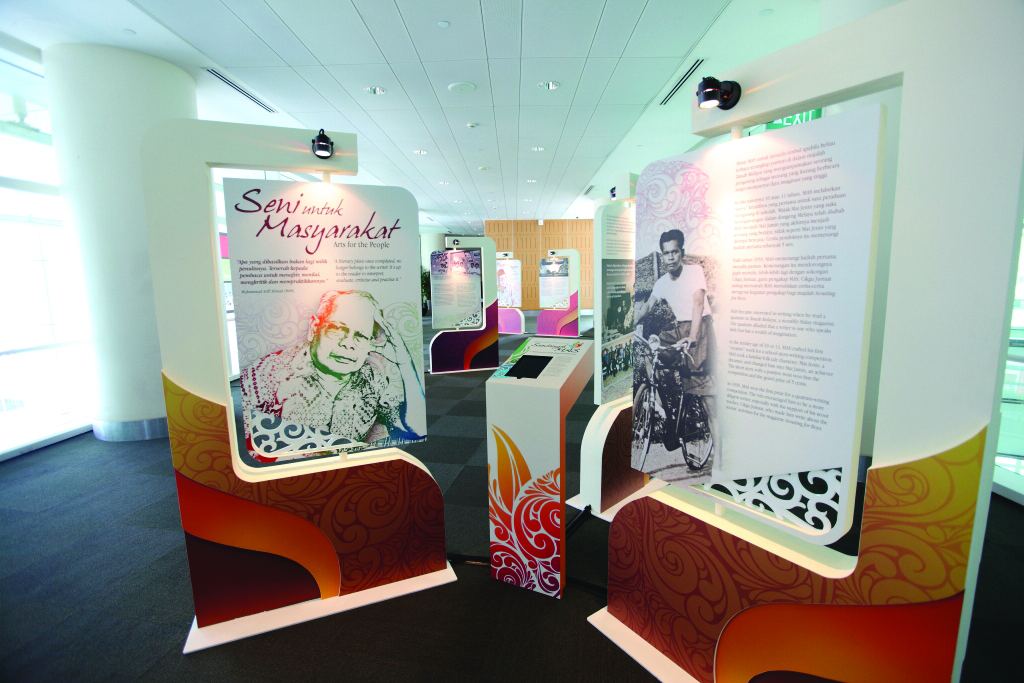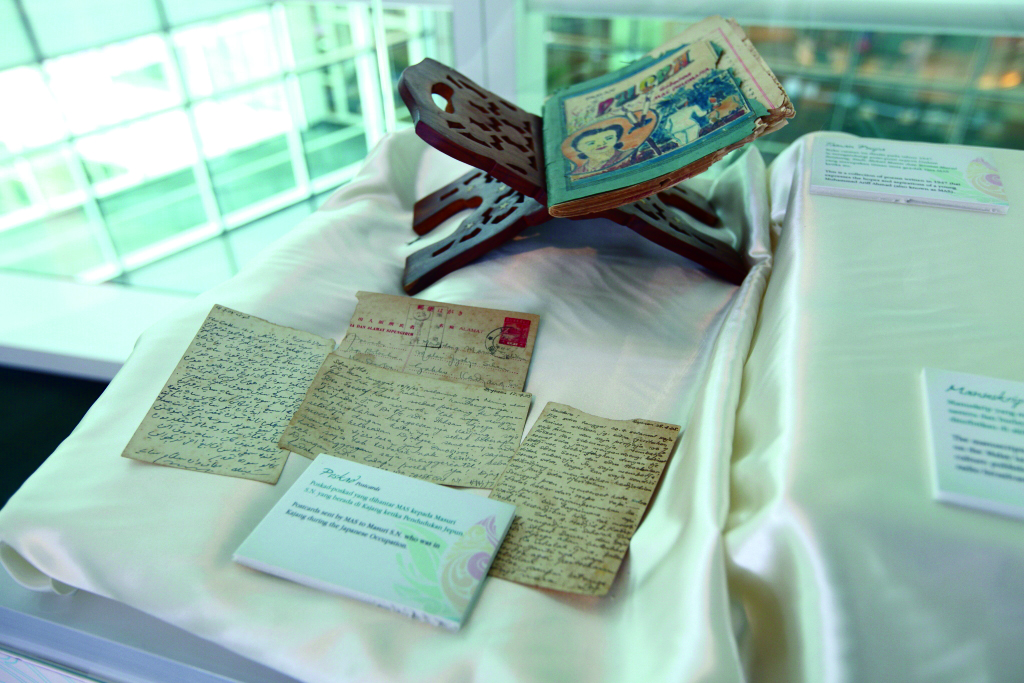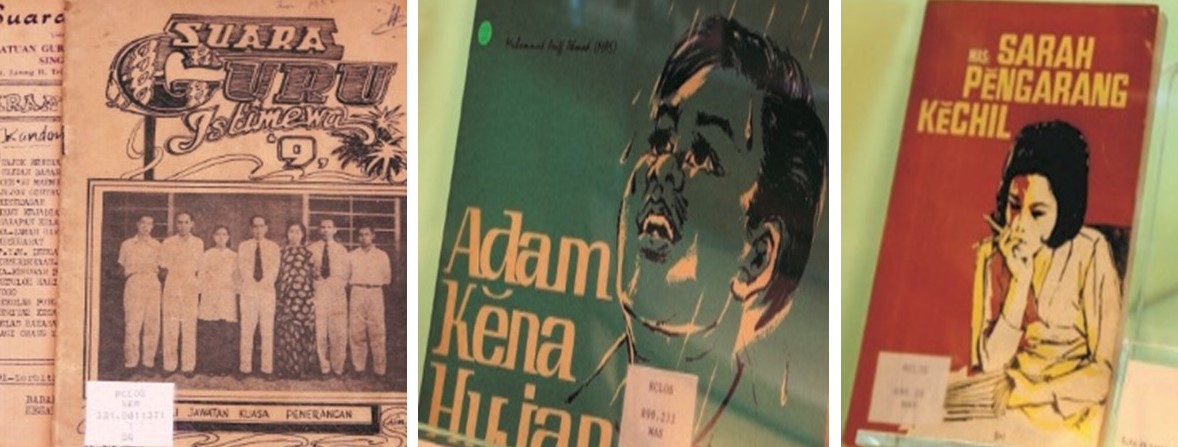Sumbangsih MAS: An Exhibition on Muhammad Ariff Ahmad
Muhammad Ariff Ahmad, better known by his pen name MAS (Muhammad Ariff Singapura), made significant contributions to Singapore’s Malay language, literature and culture.

“A prominent expert and activist of the Malay language, literature and culture who never stops writing and imparting his knowledge.” This succinctly sums up Haji Muhammad Ariff Ahmad, better known by his pen name MAS. Muhammad Ariff has many pseudonyms, of which MAS is most recognisable. MAS stands for Muhammad Ariff Singapura (Muhammad Ariff of Singapore) – an apt moniker, considering his contributions to the Malay language, literature and culture. His other pen names include M. Arba, P.L. Rajaudang, M. Foerida, Mas Malaya, Mas Tanjung Malim, Mas S.P.10 and Minamoria.
Muhammad Ariff Bin Ahmad was born in Kampong Tiong in Singapore on 6 December 1924 at 25 Outram Road. The second of four children, he lived in different parts of Singapore, including Newton Road, Dunearn Road, Tiong Bahru and Henderson Road. In the day he sold cakes made by his mother, a housewife, and every evening his father would teach him to read the Quran.
At school, Muhammad Ariff loved reading and took part in many writing competitions. He also wrote for his school’s Scouts magazine and dreamt of becoming a full-time writer. Despite being equally good at drawing, Muhammad Ariff chose to focus on writing.
After World War II, he studied at Sultan Idris Training College in Tanjung Malim, Perak, to fulfill his father’s wish for him to become a teacher. Fortunately, his career as a teacher allowed him to continue writing. Muhammad Ariff wrote numerous books including short stories, nonfiction, children’s literature and school textbooks. Besides contributing articles and essays to newspapers and magazines in Singapore and Malaysia, he also wrote drama and documentary scripts for television and radio broadcasts.
The People’s Cikgu
Muhammad Ariff’s life saw a dramatic change in November 1933. One afternoon, when playing rounders (baseball) in a field along Malcolm Road and Chancery Lane, he was “caught” by a teacher from Sekolah Melayu Tanglin Besar (Tanglin Besar Malay School), who was furious to see him not in school.
Muhammad Ariff was immediately enrolled into Primary 1 where he studied until Primary 4 in 1937. However, he had to remain in Primary 5 for three years at Sekolah Melayu Tanglin Tinggi (Tanglin Tinggi Malay School) from 1937 to 1940 because he was not yet 16 years old – the minimum age required to be a Malay teacher.
Muhammad Ariff became a trainee teacher in 1940 after completing his studies in the Malay school and was subsequently posted to Sekolah Melayu Tanglin Tinggi in 1941 when World War II broke out.
In 1942, Muhammad Ariff was called up by the Japanese to learn and teach the Japanese language in a public school. From 1943 to 1944, he taught Japanese in a special nippon-go (Japanese language) class for teachers and became a Japanese-language instructor for teachers in a language centre at Pearl’s Hill School. It was here that he realised his potential as an educator. His path towards formalising his teacher training came when the British returned to Singapore. Between 1946 to 1949, Muhammad Ariff attended formal Malay teacher training at the Sultan Idris Teacher Training College (SITC) in Perak, Malaysia.

It was in SITC that he became acquainted with many writers and activists from all over Malaya. Many of them were later involved in Malaysian politics and became important figures in postwar literary developments.
Muhammad Ariff retired as a senior lecturer at the Institute of Education. After that he was appointed as the editor of the Malay edition of Grow magazine (Majalah Mekar) published by the Ministry of Education. He also produced many school textbooks during his stints at SITC and the Institute of Education, and was behind the scheme of work for the teaching of Malay language, literature and science in Malay language for Singapore schools.
He was a member of the Romanised Malay Spelling committee that developed the Singapore Malay language. In 1966, he organised the First Malay National Language Congress in Singapore.
Muhammad Ariff’s contributions as a teacher were not confined to the realm of education. As highlighted by Guntor Sadali, former editor of Berita Harian/Berita Minggu, “Cikgu Ariff is a reference point of the community and he is ever ready with the answers when there are issues about the Malay Language.” Muhammad Ariff reached out to the community through his regular columns and broadcasts through the mainstream media.
Arts for the People
Muhammad Ariff was also one of the founding members of the Angkatan Sasterawan ’50 (ASAS ’50) a literary organisation that champions the rights of the community through its members’ writings. ASAS ’50 was established with the belief, “united we stand, divided we fall”. He commemorated the founding of ASAS ’50 on 6 August 1950 through his poem “Long-lived Unity”.
Muhammad Ariff’s first foray into creative writing was in the field of radio drama. During the Japanese Occupation, he produced drama scripts for radio broadcast. The drama series Oleh-Oleh Pembelaan Seorang Ibu and Inikah Balasanmu, based on his scripts, were broadcast in 1943.
At the same time, he decided to record and report the cruelty of Japanese soldiers. However, his short stories such as Pokok Jarak (Barbados Nut) and Pondok Buruk (Old Hut) were rejected for publication because anti-Japanese sentiments were expressed too strongly. Pak Sako (Dr Ishak Haji Muhammad), the writer for Semangat Asia, advised him to stop if he wished to stay alive.
Muhammad Ariff, together with other writer friends, was conscious of the potential of arts as an instrument to build a society that was facing an uncertain future after the Japanese Occupation. Literature became a platform to seek independence from colonial rule and redress for social injustices. It also reflected the hopes and ambition to achieve the common goal of “full independence” through their literary works and through the concept of “arts for the masses”.

In 1947, Muhammad Ariff completed his first novel, Menyahut Seruan Ibunda (Answering the Call of Motherland). It was accepted for publication by Cikgu Harun Aminurrashid. However, it was published as a series in the magazine Mutiara.
Muhammad Ariff believed that writing was his responsibility, one that allowed his fellow countrymen to view life positively and lead a meaningful existence. For instance, his novelette Sarah Pengarang Kechil, published in 1957, exemplifies his concerns on the importance of education for the next generation to achieve success. The novelette became a textbook for Malay literature. The novel Mail Mau Kawin (Mail Wants to Wed), published in 1976, considers the issues of the Malay community at the time. The importance of lifelong learning was subtly touched on as one of the ways to overcome the vicious cycle of poverty. Another example is the poem “Is It True?”, which stirred controversy when it was published in Berita Harian in 1974.
“Is It True?” encourages readers to reflect and compare truth and falsehood. It is a simple poem with deep meaning. The poem provokes readers to think about life through the beauty of poetry.
His works spanned almost 65 years of his life and comprise various themes that express his journey and struggles in the fields of literature, language and culture. At the same time, his poems serve as a documentation of our social memories.
Citizen Muhammad Ariff
Muhammad Ariff’s influence can also be seen in the fields of language and culture. He was appointed as chairman of the Malay Literature Prize committee which promoted literature in Singapore. Initiated by ASAS ’50, it was supported by 18 other nongovernmental organisations. Today, the award is known as the Malay Literary Award under the purview of the Malay Language Council of Singapore.
The Malay Language Council of Singapore is also responsible for organising the Malay Language Month campaign. Muhammad Ariff had been involved with the initiative since 1965 when it was known as the National Language Month. In 1988, he penned the lyrics to “Bahasa Menjunjung Budaya”, which remains as the Malay Language Month’s theme song till today.
Muhammad Ariff’s influence among the Malay Muslim community is evident from the numerous organisations he was part of, such as the Association of Muslim Professionals and Malay Heritage Centre Foundation. The various awards and accolades bestowed on him are testament to a life dedicated to serving the community. Even in his late eighties, Muhammad Ariff was still sharing his knowledge, thoughts and ideas via a weekly newspaper column in Berita Harian. He was indeed an iconic national treasure.
Muhammad Ariff’s many contributions to the community are a manifestation of his philosophy in life: “The life of a tree bears fruit; let the life of humans be fruitful.” Despite all that he achieved, he continued to share his knowledge, expertise and service as inscribed in the words of Kiayi (religious leader) in his poem “What will I become?”:
The Kiayi says: Be as complete as a human can be
to the Creator, to others – have piety, have compassion
so that you will get Allah’s blessings,
even the people will respect you
this will benefit you in life, even in the
hereafter, you will not lose anything…
REFERENCES
Juffri Supa’at. (2012). Sumbangsih MAS: Koleksi puisi pilihan. Singapore: National Library of Singapore (original citation); Mas. (2012). Sumbangsih MAS: Koleksi puisi pilihan. Singapore: National Library Board. (Call no.: Malay RSING 899.281 MAS)
Minamoria. (1974, November 24). Sajak harus dibaca, didengar dan dilihat. Berita Harian, p. 13. Retrieved from NewspaperSG.
Mohamed Pitchay Gani Bin Mohamed Abdul Aziz. (Ed.). (2005). Leksikon: Direktori penulis Melayu Singapura pasca 1965. Singapore: Angkatan Sasterawan ’50 & National Library Board. (Call no.: Malay RSING 899.280255957 LEK)
Muhammad Ariff Ahmad. (2003). Perjalanan Mas: Memoir Muhammad Ariff Ahmad. Singapore: Angkatan Sasterawan ’50. (Call no.: Malay RSING q499.28092 MUH)
Razak Jaafar. (1974, May 12). Janganlah jadikan taman ini medan bersenda seperti hippi dalam khayalan pil MX. Berita Harian, p. 5. Retrieved from NewspaperSG.

